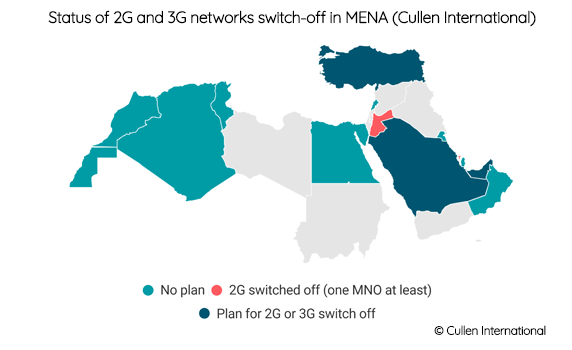Operators in the MENA region have switched off or are planning to switch off their 2G or 3G mobile networks. These initiatives are driven by the desire to reduce operational costs and to reuse the freed spectrum for advanced mobile technologies, such as 5G.
Cullen International’s new benchmark shows that operators in Jordan (Umniah) and Bahrain (Batelco) voluntarily switched off their 2G networks.
While no MENA operator has yet switched off its 3G network, STC Saudi Arabia announced that it will do so in 2022.

Operators in Algeria, Morocco, and Turkey hold technology-specific licences. Switching off any mobile network (2G or 3G) and reusing the spectrum is therefore limited by the expiry dates of the relevant licence.
In some countries, such as Turkey and the United Arab Emirates (UAE), regulators are involved in the switch-off plans:
- BTK, the national regulator in Turkey, announced that 2G and 3G networks will be switched off in 2026 and 2029, respectively.
- The UAE’s telecommunication and digital government authority announced that GSM networks will be switched off by the end of 2022.
Our new benchmark provides for 13 MENA countries on:
- whether 2G or 3G networks have been switched off, or are planned to be switched off;
- plans to deal with the customers who remain on those networks; and
- whether current licences require service providers to continue to provide 2G or 3G services.
For more information or to access the benchmark, please click on “Access the full content” - or on “Request Access”, in case you are not subscribed to our MENA Telecoms service.
more news
19 February 26
Upper 6 GHz band: EU member states wait for EU-level decisions
Cullen International has been monitoring regulation of the upper 6 GHz band at the European level and now also benchmarks regulation at the national level in Europe.
18 February 26
The DNA explained: more EU guidance to protect end users against fraud
Cullen International is issuing a series of analyses on different aspects of the Digital Networks Act (DNA) proposal. This report covers end-user rights.
13 February 26
Compensation for network outages mandated in 11 EU countries
Our latest benchmark shows whether, in selected European countries, the law or the national regulator imposes an obligation on fixed and/or mobile operators to compensate their customers when their voice or data networks fail.